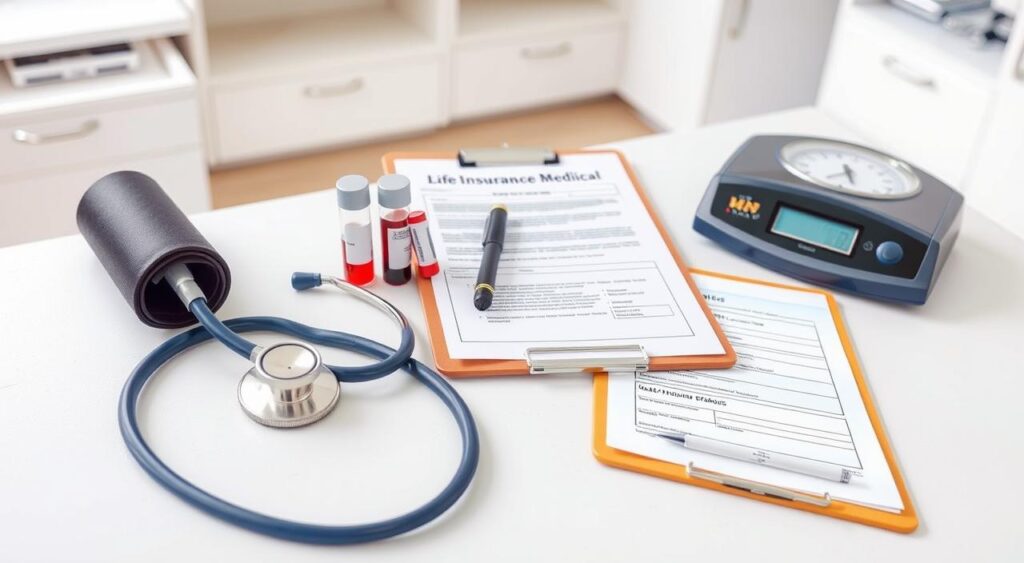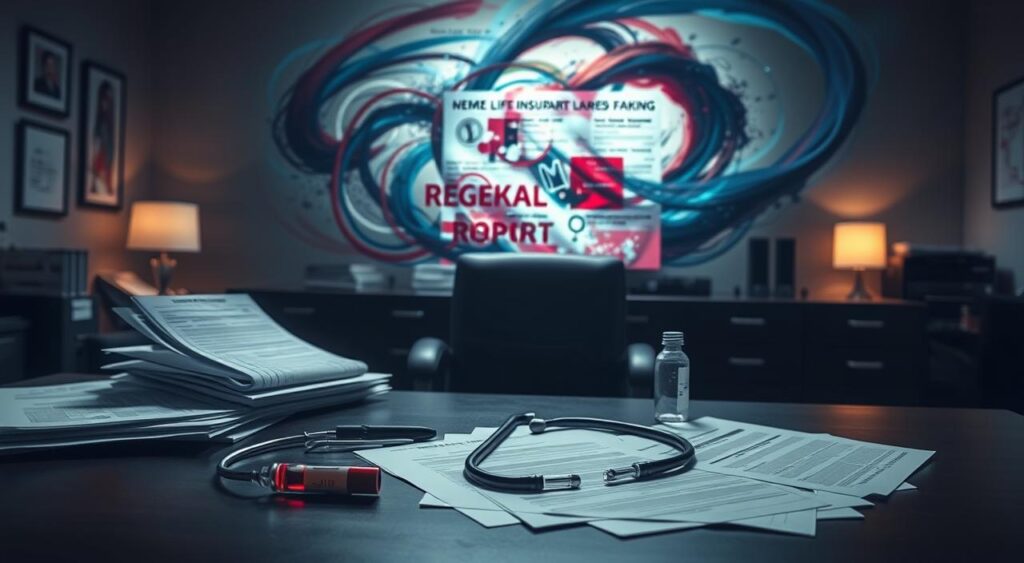Ever thought about how to make a life insurance medical exam fast and simple? This exam is key to getting life insurance. It checks your health and how much risk you are to the company. We’ll show you how to make this process quicker and more effective.
Key Takeaways
- Life insurance medical exams usually last 15 to 45 minutes, making it a quick process.
- Preparing for the exam by adjusting your diet, hydration, and lifestyle can lead to better results.
- Fasting for at least 6 hours before the exam is recommended to get accurate blood test results.
- Avoiding caffeine, alcohol, and certain medications can help ensure accurate blood pressure readings.
- Making health improvements before the exam, like quitting smoking, can positively impact your life insurance rates.
Understanding Life Insurance Medical Exams
Applicants for life insurance often have to take a medical exam. This exam is key for the insurance company to check your health. It helps them figure out how much risk you might be.
What is a Life Insurance Medical Exam?
The exam is a quick check of your physical health. A doctor will measure your height, weight, blood pressure, and pulse. They will also take blood and urine samples to check for health issues like cholesterol and blood sugar.
Why Do Insurance Companies Require Medical Exams?
Insurance companies need medical exams to understand your health and risk. They use this info to decide how much to charge you for coverage. This ensures the policy fits your health and the company’s risk.
These exams help insurance companies make smart choices about who to insure and at what cost. It’s all about matching the right policy to the right person.
| Key Life Insurance Medical Exam Requirements | Purpose |
|---|---|
| Blood and urine samples | To test for various health indicators such as blood protein levels, blood sugar levels, and white and red blood cell counts |
| Measurement of height, weight, blood pressure, and pulse | To assess overall physical health and potential risk factors |
| Review of medical history and lifestyle factors | To evaluate the applicant’s risk profile and determine appropriate coverage and premiums |
Knowing what the life insurance medical exam involves helps you prepare. It ensures you give the insurance company all the info they need to make a fair decision about your coverage.
What to Expect During the Life Insurance Exam
When you apply for life insurance, you’ll need to take a medical exam. This is a key step for insurance companies to understand your health risks. They use this info to set the right price for your policy. Here’s what you’ll face during the exam.
Interview and Medical History Review
The first thing the examiner will do is review your health questions from the application. They might ask more about your medical history, medications, and family health. They also want to know about your lifestyle habits that could affect your risk.
Physical Examination
Then, the examiner will measure your height, weight, blood pressure, and pulse. They might also do an EKG to check your heart. This depends on your age and how much coverage you want.
Blood and Urine Samples
The examiner will take blood and urine samples for lab tests. These tests check for things like cholesterol, blood sugar, and nicotine or drug use. The test results are very important for the insurance company.
The exam usually takes 15 to 45 minutes. The insurance company pays for it. It’s important to schedule it quickly to avoid delays in your application.

Knowing what to expect during the life insurance exam helps you prepare. It ensures a smooth application process. By understanding the exam’s components, you can provide the info insurers need to decide on your coverage.
How to Prepare for a Life Insurance Medical Exam
Getting ready for your life insurance medical exam is key to a good outcome. Simple lifestyle changes a few weeks before can help. They might even get you better rates on your policy.
Weeks Before the Exam
- Eat a healthy, whole-food diet.
- Drink less alcohol and quit nicotine.
- Drink lots of water to stay hydrated.
Day Before the Exam
The day before, don’t drink alcohol or smoke. Make sure you get a good night’s sleep. This will help you feel rested for the exam.
Day of the Exam
- Avoid caffeine and don’t exercise too hard.
- Have your medical info, like any meds, ready.
- Wear comfy clothes for easy blood pressure and blood draws.
By following these steps, you can get the best results from your exam. This might even save you money on your policy. The goal is to show you’re a low-risk candidate.

Importance of Fasting Before the Blood Test
Fasting before your life insurance blood test is very important. It makes sure the test results are accurate. Insurance companies usually ask you to fast for 8 to 12 hours before the test.
This fasting time is key. It helps give more reliable readings of important health markers. These include cholesterol, glucose, and other health indicators.
How Long to Fast Before the Life Insurance Blood Draw
The fasting time for a life insurance blood test is usually 8 to 12 hours. You should not eat or drink anything (except water) for this time before your blood draw. This fasting helps make sure your test results show your true health levels.
Insurance companies use these results to check your health and risk. It’s crucial to follow their fasting guidelines for the best test results. Not fasting correctly can lead to wrong readings. This could affect your coverage or premiums.
You might also need to avoid hard exercise, alcohol, and some supplements before the test. Following these rules helps get the most accurate and useful results from your medical exam.
“Fasting for 8 to 12 hours before a life insurance blood test is a common requirement to ensure accurate measurements of important health markers like cholesterol and glucose levels.”
Potential Disqualifying Factors
Getting life insurance can be tricky if you have certain health issues or lifestyle choices. Health conditions that disqualify for life insurance include recent cancer, uncontrolled blood pressure or cholesterol, and illegal drug use.
But, some pre-existing conditions might still qualify if managed well. The factors that affect life insurance approval depend on the insurance company and your medical history.
| Rating Category | Characteristics |
|---|---|
| Preferred Plus |
|
| Preferred |
|
| Standard Plus |
|
| Substandard |
|
Be truthful about your health when applying for life insurance to avoid life insurance medical exam failure. Knowing the disqualifying factors helps you work on your health. This way, you can get the coverage you need.

“Understanding your medical history and lifestyle factors is crucial in determining your eligibility for life insurance coverage and the rates you may be offered.”
Where to Get a Life Insurance Medical Exam
When you apply for life insurance, a medical representative will come to you. You can have the exam at home, work, or a medical center. The examiner will do the interview, physical exam, and collect samples at your preferred location.
The exam is quick, taking less than 30 minutes. It includes measuring your height, weight, and blood pressure. They also take blood and urine samples to check your health.
Convenient Exam Locations
- Your home
- Your workplace
- Paramedical service exam centers
The examiner will visit you at a place that’s easy for you. This makes the exam process simple and accessible.

You can also book your exam online or by phone. This way, you can pick a time and place that works for you.
“The life insurance medical exam is a straightforward process that can be completed quickly and at a location of your choice, making it a convenient step in the application process.”
Understanding Blood Test Results
Interpreting life insurance blood test results is key in the application process. The blood and urine samples collected during the medical exam are analyzed. They check for health indicators like cholesterol levels, glucose levels, and drugs or substances. Insurance providers review these results to assess your health and decide on coverage and rates.
What do life insurance blood tests check for? Insurers look at total cholesterol levels, the ratio of total cholesterol to HDL (good) cholesterol, and hemoglobin A1C. High cholesterol or a bad cholesterol ratio can lead to higher premiums or policy denials. High glucose levels or illegal substances can also affect your eligibility.
Understanding life insurance medical exam findings is crucial. Factors like liver enzyme levels and nicotine or cotinine presence can impact the insurance company’s decision. Knowing what these test results mean can help you prepare for the exam and address any issues.
“The blood and urine samples collected during the life insurance medical exam will be analyzed for various health indicators, such as cholesterol levels, glucose levels, and the presence of drugs or other substances.”
By understanding your blood test results, you can improve your health and get better life insurance rates. Talk to your healthcare provider and make lifestyle changes. Improving your diet and exercise routine can help optimize your medical exam findings and ensure you get the best life insurance coverage.

Dealing with Denial Due to Medical Exam
Applying for life insurance can be tough, especially if you get denied because of your medical exam. But, there’s hope. You can take steps to fix the issue and maybe get the coverage you want.
If your application is denied, ask the insurance company for a written explanation. Check the exam results for mistakes or false positives. Knowing why you were denied helps you tackle the problem better.
If you think the exam results are wrong, talk to your doctor. They might give more info or documents to support your case. This could help you dispute the denial.
You might also look into life insurance that doesn’t need a full medical exam. Options like simplified issue or guaranteed acceptance policies might have higher costs. But, they could be a good choice if you’ve been denied for medical reasons.
“The key is to stay persistent and explore all available options. With diligence and the right approach, you can often find a life insurance solution that meets your needs.”
Life insurance companies follow strict rules. By understanding these rules and working with your doctor and the insurance company, you can improve your chances of getting the coverage you need.

Life Insurance Options Without Medical Exams
Traditional life insurance often needs a medical exam. But, there are other ways to get coverage without one. Options like accelerated underwriting, simplified issue, and guaranteed issue life insurance are available. They might cost more, but they’re good for those who can’t pass a medical exam.
Guaranteed issue life insurance is offered by companies like Aflac in some states. It doesn’t ask for medical questions or exams. This makes it easier for people with health issues to get coverage.
Simplified issue life insurance lets you skip the medical exam by answering health questions and providing medical records. It’s more expensive, but it’s a good choice for those who can’t have a full medical check-up.
- Employer-sponsored life insurance plans often don’t need a medical exam. They can be affordable or even free, with fewer health requirements.
- Short-term life insurance policies without a medical exam can be bought online quickly. They ask basic health questions and are for younger people or those needing temporary coverage.
Choosing life insurance without a medical exam might mean paying more. Insurance companies find it hard to guess your health risks without a check-up. Still, these options can offer valuable coverage for those who can’t get traditional insurance.
| Life Insurance Option | Medical Exam Required? | Typical Cost |
|---|---|---|
| Guaranteed Issue | No | Higher Premiums |
| Simplified Issue | No, but health questions | Higher Premiums |
| Employer-Sponsored | No | Lower/Affordable |
| Short-Term | No, basic health questions | Affordable |

Looking into life insurance without a medical exam? Think about the higher costs and possible coverage limits. Yet, these options can still offer important protection for those who can’t get traditional insurance.
Tips for Getting the Best Life Insurance Rates
To get the best life insurance rates, you need a plan. Start making healthy lifestyle changes before your medical exam. This can help you qualify for cheaper coverage.
Your health is a big factor in life insurance costs. Eating right, keeping your blood pressure and cholesterol in check, and avoiding tobacco and too much alcohol can help. Also, compare quotes from different insurers to find the best deal for you.
- Maintain a healthy weight through a balanced diet and regular exercise.
- Keep your blood pressure and cholesterol levels within the recommended range.
- Quit or reduce your use of tobacco products.
- Limit your alcohol consumption to moderate levels.
- Compare life insurance quotes from multiple providers to find the best rates.
| Factor | Impact on Life Insurance Premiums |
|---|---|
| Age | Older applicants typically pay higher premiums. |
| Gender | Women generally have lower premiums than men. |
| Health Status | Individuals with pre-existing conditions or unhealthy habits may face higher rates. |
| Occupation | Dangerous or high-risk jobs can increase premiums. |
| Lifestyle | Factors like smoking, alcohol use, and risky hobbies can impact rates. |
Know what affects life insurance rates and work on improving your health and lifestyle. This way, you can get the most affordable coverage. Your effort and focus can really help lower your policy cost.
“Investing in life insurance is one of the most important financial decisions you can make. By taking the time to prepare and optimize your health, you can ensure that you get the best possible rates and coverage for your needs.”
Scheduling and Logistics of the Medical Exam
When you apply for life insurance, the company will arrange for a medical visit. This can happen at your home or work. The exam usually takes 15 to 45 minutes. The examiner will collect the needed samples and info.
The steps for scheduling and logistics of the life insurance medical exam are important:
- The insurance company will call you within 24-48 hours to set up the exam. They will do this based on when you are free.
- The exam can be done quickly. It takes 25-35 minutes for a paramedical exam, 30-40 minutes for a doctor’s exam, and 30-40 minutes for an internist/cardiologist exam.
- Services like Vitals, Saliva Specimens, Urine Specimens, and Blood Profiles take 10-15 minutes each.
- A Resting Electrocardiogram (ECG) takes about 20 minutes. A Stress ECG takes 30-45 minutes and needs a cardiologist/internist at a fixed facility.
- X-Rays can’t be done on the go. They take 5-10 minutes, but you might have to wait.
The life insurance exam provider makes scheduling and logistics easy. This ensures a smooth and timely experience for you.
“Dynacare promises to contact the client within 24-48 hours upon receiving the order and to schedule the appointment within 72 hours, subject to client availability.”
The life insurance medical exam process is designed to be simple and quick. This allows you to finish the requirements easily and fast.
Lifestyle Changes for Better Health and Lower Premiums
Making positive lifestyle changes can improve your health and lower life insurance premiums. By keeping a healthy weight, controlling blood pressure and cholesterol, and avoiding tobacco and excessive alcohol, you can significantly impact your life insurance rates.
It’s important to start these healthy habits before your life insurance medical exam. Quitting smoking, reducing alcohol, and losing weight can lower your life insurance costs. This is because they improve your eligibility and risk profile.
Here are some tips to get the best life insurance rates:
- Eat a healthy diet full of vegetables, fruits, and whole grains to support your wellness.
- Exercise regularly to keep your heart and body in top shape.
- Ensure you get enough quality sleep to boost your immune system and health.
- Manage stress levels through relaxation techniques or counseling, if needed.
- Avoid risky behaviors, such as reckless driving or dangerous hobbies.
By making these lifestyle changes, you can significantly lower your premiums. This will give you peace of mind with comprehensive life insurance coverage.
“Investing in your health today can pay dividends for years to come, both in terms of your overall well-being and your life insurance costs.”
| Lifestyle Factor | Impact on Life Insurance Rates |
|---|---|
| Smoking | Smokers typically pay 2-3 times more for life insurance premiums compared to non-smokers. |
| Body Mass Index (BMI) | Individuals with a BMI over 30 may face higher premiums or even denial of coverage. |
| Alcohol Consumption | Heavy or excessive alcohol use can lead to increased rates or policy exclusions. |
| Driving Record | A history of speeding tickets, accidents, or DUIs can negatively impact life insurance costs. |
Conclusion
Preparing for a life insurance medical exam is key. It can greatly affect the rates you get. By making healthy changes before the exam, you can boost your chances of getting good rates.
The tips in this article, like fasting right and avoiding certain activities, are helpful. They show you’re serious about your health. This can make your test results better and show the insurance company you care about your health.
Preparing well for the medical exam can lead to better rates and coverage. By focusing on your health and following these tips, you can feel confident. You’ll also make sure your loved ones are financially protected.

